Charting the Course for Prostate Cancer Patients
Developing the right prostate cancer treatment plan for each patient is complex. The prostate cancer experts at the UCLA Health Jonsson Comprehensive Cancer Center operate the longest-running Specialized Program of Research Excellence (SPORE) site in California, as designated by the National Cancer Institute.
The goal of the UCLA SPORE in Prostate Cancer is to contribute significantly to progress in the diagnosis, prevention and treatment of prostate cancer. Through the Prostate Cancer SPORE, UCLA Health patients have access to new and innovative treatment approaches and the latest translational research.
A Unique Approach to Treatment Decision-Making
Christopher Saigal, MD, explains how Wisercare software allows physicians to tailor treatment options based on each individual's preferences and clinical risk factors. Personalized care is supported by evidence-based outcomes, which enhances decision quality and promotes long-term satisfaction.
Personalized Treatment and Leading-Edge Research
Led by Robert Reiter, MD, UCLA Health's prostate cancer program combines exemplary patient care with pioneering research and personalized treatment options. Through the SPORE grant and extensive databases, physicians translate discoveries into effective clinical practices, ensuring individualized care for every patient.
Advances in Prostate Cancer Care Surveillance
Leonard Marks, MD, and Wayne Brisbane, MD, share a progressive approach to managing low-risk prostate cancer through active surveillance. UCLA Health’s prostate cancer registry tracks patient outcomes, enhances personalized care and advances research in focal therapy, offering patients a vigilant and effective alternative to surgery and radiation.
Trailblazing Cancer Therapies
Numerous successful therapies developed by UCLA Health Jonsson Comprehensive Cancer Center physicians and scientists are changing the treatment paradigms for patients with cancer. Since 2014, the U.S. Food & Drug Administration (FDA) has approved 23 therapies that were either developed or co-developed through research conducted in UCLA labs and/or clinical trials in UCLA Health clinics.
Where Patient Outcomes Matter Most
UCLA Health combines a patient-first approach with the most advanced cancer research and innovation in California. UCLA Health gives patients the power to leverage clinical evidence and choose options that fit their personal preferences. We’re home to the only program in California that uses a personalized, software-based patient assessment to determine the best prostate cancer treatment option.
At UCLA Health, our commitment to excellence yields unparalleled outcomes for patients with cancer. From new diagnoses to those with advanced disease, patients find hope at UCLA Health.
Chad Rubel, 42, was diagnosed with prostate cancer when he was young, without any known risk factors. Through shared decision-making, he opted to undergo a radical prostatectomy.
Andre LaPierre, 67, joined a clinical trial involving PSMA radioguided surgery. His surgeon successfully removed a difficult-to-find cancerous node.
John Babcock, 68, transferred to UCLA Health for a clinical trial involving the use of short-course radiotherapy.
An Elite Team of Experts
The UCLA Health Jonsson Comprehensive Cancer Center is home to the deepest bench of prostate cancer experts in California. Our team of urologic oncologists collaborates across the continuum of care to achieve the best outcomes for patients:
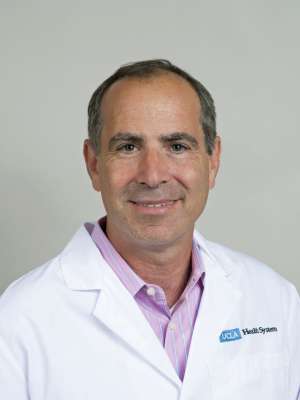
Robert Reiter, MD
Urology | Minimally Invasive Urology | Urologic Oncology
Dr. Reiter is the Bing Professor of Urologic Oncology, Chief of the Division of Urologic
Oncology, and Director of UCLA's prostate cancer program. He attended Stanford Medical School,
completed his urologic training at Stanford and Baylor College of Medicine, and completed
additional fellowship training in urological cancer at the National Cancer Institute. Dr. Reiter
was awarded the Outstanding Achievement Award by the Urologic Oncology branch of the National
Cancer Institute.
Dr. Reiter is an internationally recognized expert in all areas of prostate cancer management
and research. He was among the first to integrate functional MRI imaging and PSMA PET imaging
into the diagnosis, surgical management, and care of men with prostate cancer. He was also an
early innovator in the field of robotic surgery, and has completed more than 2,500 robotic
prostatectomies. In addition to surgical management of prostate cancer, Dr. Reiter has expertise
in MRI-guided biopsies to diagnose prostate cancer, focal therapy to treat select individuals,
as well as all forms of medical therapy. Dr. Reiter has a particular interest in the
multidisciplinary management of men with high-risk prostate cancer, incorporating the latest in
genomics, clinical trials, and precision medical therapies into treatment plans in collaboration
with UCLA leaders in the areas of radiation, medical and nuclear prostate oncology.
In addition to his broad clinical interests in prostate cancer, Dr. Reiter is a leading
researcher in prostate cancer and has led UCLA’s 12 million SPORE grant, which supports work to
translate laboratory discoveries into clinical advances, for more than 15 years. Drugs such as
enzalutamide and apalutamide, and imaging tools such as PSMA PET, are among the many advances
that have emanated from this program. His own laboratory discovered the prostate stem cell
antigen and developed antibodies to target this protein, which has led to novel imaging and
therapeutic approaches for prostate cancer currently in clinical trials. Dr. Reiter has authored
more than 250 papers and lectures nationally and internationally on all aspects of clinical care
of men with prostate cancer.
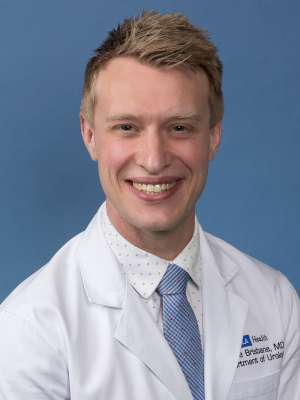
Wayne G. Brisbane, MD
Urologic Oncology | Urology
Dr. Brisbane is an assistant professor of urology. Dr. Brisbane received his medical degree from
Loma Linda University School of Medicine. He completed a General Surgery internship and Urology
residency at the University of Washington. He completed his Urologic Oncology fellowship at
UCLA, focusing on prostate cancer.
Dr. Brisbane's research and clinical care focus on image-guided biopsy, surgery, and focal
therapy. UCLA is one of the few institutions to offer both clinical and research programs in
Micro-Ultrasound, Magnetic Resonance Imaging (MRI), and PSMA PET CT/MRI.
Dr. Brisbane offers multiple forms of prostate cancer treatment and enjoys helping patients find
the treatment best suited to curing their cancer while minimizing side effects.
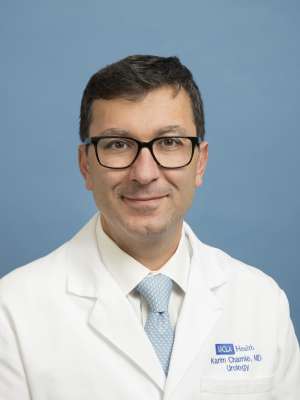
Karim Chamie, MD
Minimally Invasive Urology | Urology| Urologic Oncology
Dr. Chamie is an Associate Professor of Urology at UCLA. He attended Medical School at USC and completed Urological training at UC Davis. Dr. Chamie then completed an SUO-certified fellowship in Urologic Oncology at UCLA. His primary research interests are health services research and clinical trials in bladder cancer. His clinical interests include all areas of urologic oncology, with a particular emphasis on bladder cancer and robotic surgery.
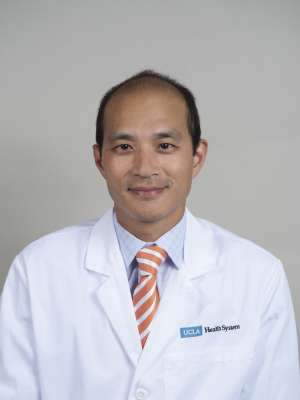
Arnold I Chin, MD, PhD
Minimally Invasive Urology | Urology | Urologic Oncology
Dr. Chin is a professor of urology and medical director of Urology-Westwood. He completed his
M.D., Ph.D. and urology residency training at UCLA. His clinical expertise includes urologic
oncology and renal transplantation. He performs open, laparoscopic, and robotic-assisted
surgeries for patients with all urologic malignancies including bladder, kidney, and prostate
cancer.
Dr. Chin's laboratory is dedicated to improving the lives of patients with urologic
malignancies. Much of their initial studies have focused on understanding the molecular pathways
that program the tumor infiltrating lymphocytes in bladder and prostate cancer, which they have
shown can influence tumor growth, ability to metastasize and response to immune-based therapies.
More recently, they began studying the characteristics and drivers of bladder cancer stem cells.
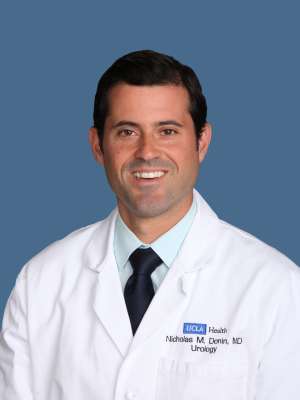
Nicholas Donin, MD
Urology | Urologic Oncology
Dr. Donin is an assistant clinical professor of urology at the David Geffen School of Medicine at
UCLA. He received his medical degree from Columbia University, and completed his urology
residency at New York University. He then completed a Society of Urologic Oncology Fellowship at
UCLA. He received his bachelor's degree from Harvard University.
Dr. Donin’s clinical focus is in the treatment of urologic cancers, including cancers of the
kidney, prostate, bladder and testis, as well as medical and surgical treatments for benign
prostate hypertrophy (BPH). Dr. Donin has advanced training in robotic-assisted surgery using
the Da Vinci robotic surgical platform.
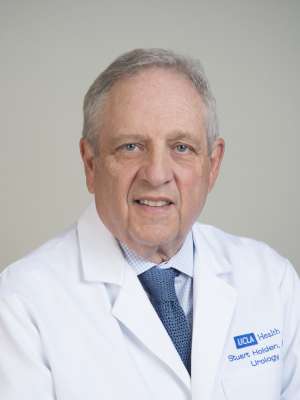
Stuart Holden, MD
Urologic Oncology | Urology
Dr. Holden is a clinical professor of urology and co-director of the UCLA Institute of Urologic Oncology. He received his medical degree from Weill Cornell Medical College. He completed his urology residency training at Emory University School of Medicine and a urologic oncology fellowship at Memorial Sloan-Kettering Cancer Center. Dr. Holden is recognized as an expert in prostate cancer care and research. His dedication to patient care led to him being named medical director of the Prostate Cancer Foundation.
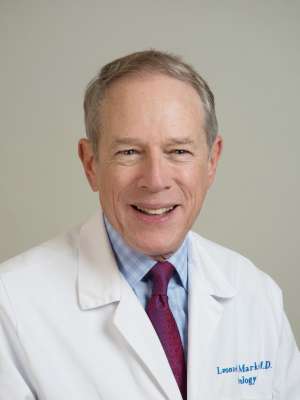
Leonard S. Marks, MD
Urology | Urologic Oncology
Dr. Marks is a professor and the deKernion Endowed Chair in urology. He received his medical
degree from the University of Texas, graduating with AOA honors and a Masters of Arts in
Physiology in 1969. He was named a fellow and post-doctoral research scholar at the David Geffen
School of Medicine at UCLA where is also completed his residency. Dr. Marks has clinical
expertise in focal therapy, HIFU, cryotherapy and active surveillance for prostate cancer.
Dr. Marks leads a multi-disciplinary research collaborative involving urology, radiology,
pathology, and bioengineering. His current research focuses on improving prostate cancer
diagnostic measures and outcomes and exploring and assessing efficacy of active surveillance and
various focal therapy treatments, including cryoablation, HIFU, and FLA for primarily low- to
intermediate-risk prostate cancer. He is an authority in targeted MRI fusion prostate biopsy and
has authored more than 120 peer-reviewed scientific publications on prostate research.
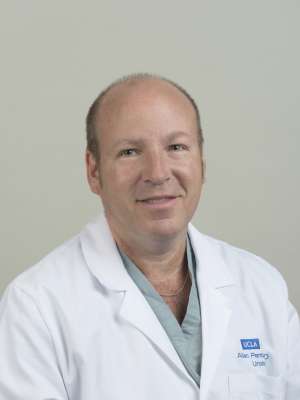
Allan J. Pantuck, MD
Urology | Urologic Oncology
Dr. Pantuck is a professor of urology and vice chair of academic affairs for UCLA Urology. He earned his medical degree from Robert Wood Johnson Medical School and his master of science degree from the David Geffen School of Medicine at UCLA. He completed his urology residency at Robert Wood Johnson University Hospital and his urologic oncology fellowship at UCLA. Dr. Pantuck specializes in kidney, prostate and bladder cancers, and has a long standing interest in developing new treatment strategies through basic and clinical research. His research focuses on the molecular and genetic determinants underlying response to immunotherapy in patients with kidney cancer, as well as the nutritional aspects of bladder and prostate cancer prevention and treatment.
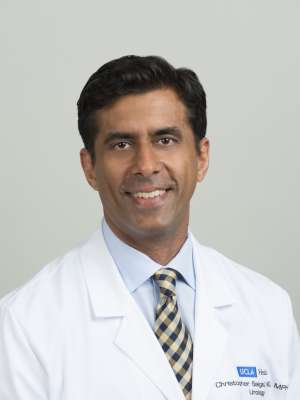
Christopher Saigal, MD
Minimally Invasive Urology | Urology| Urologic Oncology
Christopher Saigal MD, MPH is Professor and Vice Chair of Urology at the UCLA School of Medicine and a PI at RAND Corporation. Dr Saigal’s major research area is in shared decision making, where he has been funded by an R-01 from the National Cancer Institute to innovate new approaches to shared decision making in men with prostate cancer. As a former Gallagher Health Policy Scholar and American Urological Association Quality Improvement and Patient Safety committee member, he has provided leadership on behalf of the AUA in many arenas, including the Surgical Quality Alliance. He has chaired or served as a committee member for several National Quality Forum (NQF) surgical quality measurement efforts. He also co-chaired the NQF decision aids certification panel, and is a leader in the NQF Shared Decision Making action team. His surgical practice in urologic oncology is at the Ronald Reagan Medical Center in Westwood.
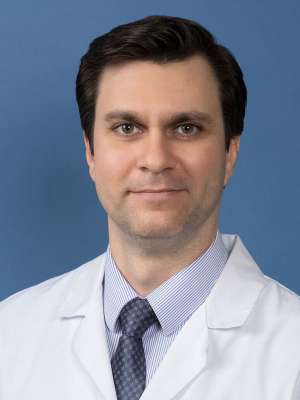
Joseph Shirk, MD
Urology | Urologic Oncology
Joseph D. Shirk, MD is the Chief of Urology at the Greater Los Angeles VA Health System and
Assistant Professor of Urology at the David Geffen School of Medicine at UCLA.
Dr. Shirk earned his medical degree from the Medical College of Wisconsin. He completed his
intern year at Boston Medical Center and subsequently completed his urology residency at the
University of California, Los Angeles (UCLA) and urologic oncology fellowship training at UCLA’s
Institute of Urologic Oncology (IUO) and David Geffen School of Medicine.
Dr. Shirk performs complex urologic oncology operations, including robotic cystectomy, partial
nephrectomy, retroperitoneal lymph node dissection, and tumor thrombectomy. His primary research
interests include the development and use of advanced, innovative imaging techniques.



















